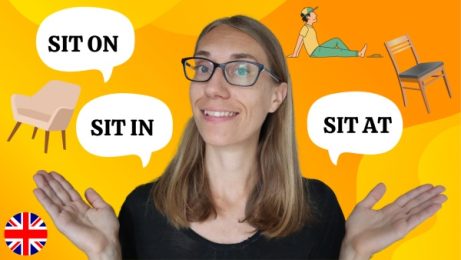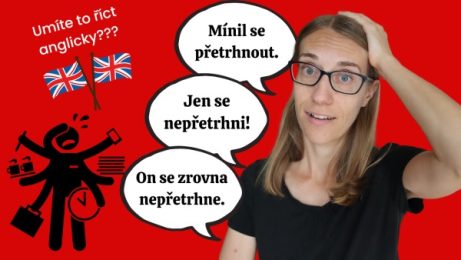Učte se anglicky se scénou z filmu Pelíšky
Vánoce jsou za dveřmi a spousta z nás si určitě s oblibou pustí o svátcích Pelíšky. Tenhle film je prostě klasika, bez které by to snad ani nebyly Vánoce. Napadlo vás ale někdy, jak vypadají a působí Pelíšky v anglickém překladu? Mně to vrtalo hlavou už nějakou dobu, protože je to ryze český film plný českého humoru a české povahy. Lze vůbec něco takového převést do jiného jazyka? Pojďme se společně naladit na blížící se svátky s kultovní vánoční scénou z Pelíšků a zároveň se na tuto scénu podívat s anglickými titulky. Naučíte se spoustu zajímavé slovní zásoby a také se dozvíte, jakým výzvám často čelí překladatelé a jak si s nimi poradit. Ready? Let’s get to it! 🙂
Pelíšky asi není třeba představovat, ale jen pro pořádek, tady je ČSFD profil, pokud byste se o filmu chtěli dozvědět víc. A teď už pojďme na to.
Check out the transcript of the scene
Learn the vocabulary
What happens when…? – Co se stane, když…?
to drop something – upustit něco, spadnout někomu něco
ordinary – obyčejný
a glass – sklenička, sklenice
the floor – zem, podlaha
to break – rozbít se (nepravidelné: break broke broken)
Exactly. – Přesně tak. (dáváme někomu za pravdu)
used to do something / used to happen – vazba, která vyjadřuje, co se vy minulosti stávalo nebo co jsme dělávali (už se to ale nestává / už to neděláme)
a couple of… – pár, několik (koho, čeho)
a smart guy – chytrý chlápek, chytrý člověk
to get together – sejít se (na jednom místě), dát se dohromady (nepravidelné: get got got)
to grin – zubit se, křenit se
enough – dost, stačí
a coincidence – náhoda
it’s no coincidence… – není náhodou, že…
to come from somewhere – pocházet odkud, být odkud (nepravidelné: come came come)
Socialist Poland – socialistické Polsko
famous – slavný
a Polish woman – Polka
well… – no…, tak tedy…
unbreakable – nerozbitný
What do you mean? – Co tím myslíš? Jak to myslíš? (nepravidelné: mean meant meant)
a miracle – zázrak
to smash something – mrštit čím, třísknout čím, prásknout čím
to go all the way – jít do čeho naplno, dotáhnout něco do konce (nepravidelné: go went gone)
a glassmaker – sklář
to have nothing to eat – nemít co jíst (nepravidelné: have had had)
Zmíněná doplňková videa
Vazba USED TO
Stop doing NEBO stop to do something?
Předpona UN-
And that’s it. I hope you had as much fun as I did. Thank you so much for learning English with me. Merry Christmas to you and your families, my favourite people! 🎄
Also, don’t forget to do your homework. Using English in practice is the best way to learn. So here’s my question:
What is your favourite scene from the film and why? Tell me in the comments. English only, please!
Pokud máte otázky či postřehy, pište je do komentářů. Ráda odpovím, poradím… 😉
P.S. Všechnu slovní zásobu z tohoto videa se můžete učit a opakovat si v tomto kurzu na Memrise. Doporučuju to udělat, protože tak si je zábavnou formou upevníte do dlouhodobé paměti. 🙂 (Nevíte, co je Memrise? Více info zde.)
P.P.S. Pomáhají vám má videa či kurzy a chtěli byste mě podpořit? Můžete. Thank you very much, you’re the best! 🙂


Proč se s angličtinou trápit, když to jde jinak? Pojďte se ji učit se mnou.
Efektivně a zábavně! :)




Hi Market,
let me first to wish you Merry Christmas and Happy New Year 2024. I have seen the movie Pelíšky so many times that I can say I know it inside out. It is really difficult to translate a Czech informal speach to English. Generally speaking it is hard in all languages of the world.
„But then a couple of smart guys got together…“ Wouldn’t be possible replace the word „guys “ with „brains“?
“ …and said enough! It’s no coincidence they all came from Poland, Socialist Poland!“ …they gathered in socialist Poland.
„It’s no coincidence. The famous Polish woman, Madam Curie-Skłodowská, came from Poland“. I think this translation is the only possible. If the interpreters had wanted to be more realistic, they would have explained that the surname Sklodowska consits of the word „Sklo“ that means glass in Czech, which is impossible in such a short sentense in a subtitle. If I talked to someone face to face, it would be possible and it might be understandable for them, but I am not sure.
„Well… It’s an unbreakable glass!“ …it’s simply an unbreakable glass!
That is all I wanted to ask you, thank you for your reply.
Your eternal student of English
Hi there, František,
great to hear from you. Merry Christmas and Happy New Year of 2024 to you and your family, too! I hope life’s been treating you well. 😊
Agreed. Translating anything from one language into another is challenging, especially informal speech. Not to mention the unusual sense of humour the film is well known for. I wouldn’t use „guys with brains“. I don’t think it would work in English. It sounds a bit weird, to be honest. 😀
They gathered in socialist Poland. – I guess we could use „gather“ in this context. It implies that the people came together and formed a specific group with a specific purpose in Poland.
„It’s no coincidence. The famous Polish woman, Madam Curie-Skłodowská, came from Poland“. – I agree with you. It you translated written text, it would be easy to include a footnote with an explanation what „sklo“ means in Czech. That’s impossible to do when translating subtitles though.
„Well… it’s simply an unbreakable glass!“ – Yes, we could say that. Simply could also be replaced with just.
Thank you so much for watching the video and coming up with your own translation. You did great!
All the best,
Markét
Hi Markét,
All the best in 2024.
Watching a Czech movie with English subtitles is an unusual idea for me—an excellent idea for another way how to practice English. Your explanation is also helpful for learners. I love this movie because I feel in the same shoes as Jindřiška. Relationships in our family were the same, and the scenes around Christmas were typical of my childhood. I like the scene with dumplings (in my teenage age, I had the same rebellious approach arguing with my father). People are laughing, but I had a very similar experience in my life. Were the authors at our place for a visit? It also was terribly sad when the mother died (as my mum also died of cancer). I always cry in this scene…
Hi there, dear Ivana,
thank you so much for your kind words. Happy New Year to you and your loved ones, too! May it be the best year of your life! 😉
Thanks for sharing your similarities to Jindřiška with us. I’m sorry to hear you don’t have only the nice things in common. Life happens, right?
Happy New Year to you and your loved ones. May it be the best year of your life! 🙂
Have fun learning English,
Markét